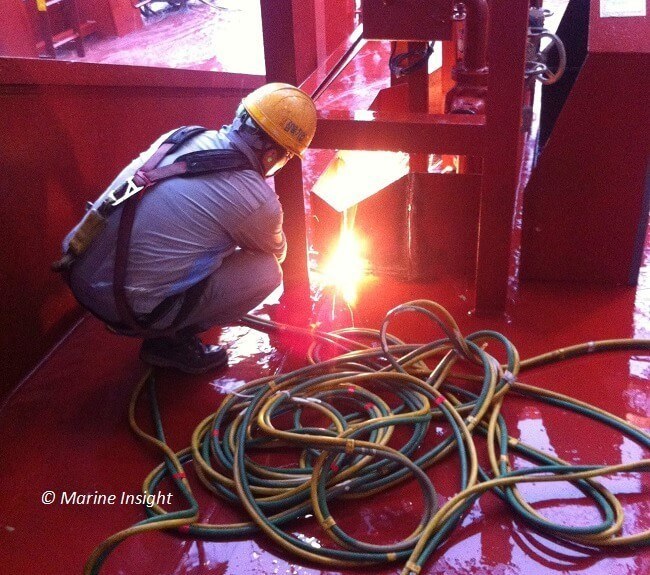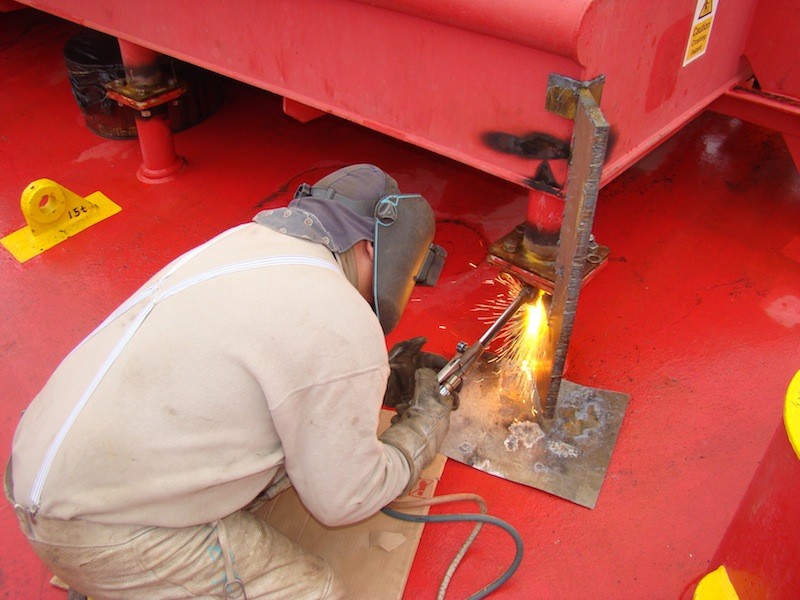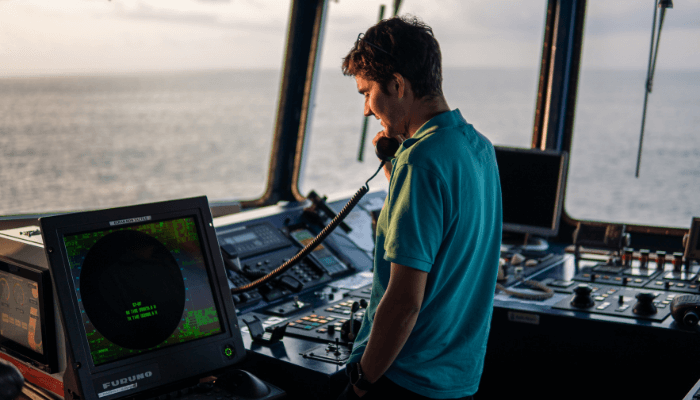Black Friday 2025 Sale
List of Processes Used in Marine Workshop of Ships
Workshop technology is the backbone of any engineering industry and when it comes to shipping, it becomes the most important aspect which is responsible for planning, construction and operation of a ship and its machinery. In this article, we will discuss the most common work shop technology elements which are widely used in shipping industry, both in ship and on shore.
Any construction and operation of shipping structure or machinery is not possible without the following workshop practices:
Welding
It is the process by which metals are joined by heating and melting the metals and simultaneously adding filler material. This forms a weld pool and makes a strong joint when cooled down. It functions on the principle of coalescence. Welding is widely used for fabrication and maintenance operations. Different types of welding are electric arc, laser, electronic beam etc but the most famous out of these is electric arc welding.

Brazing
It is the process of joining metals by heating base metals at a temperature of 800°F after which a nonferrous filler metal with a melting point well below the base metal is added to form a strong joint by capillary action. When brazing is done, flux is used as it prevents the oxide formation while the metal is heated
Gas Cutting
Gas cutting is the process of cutting metals by application of high temperature flame or torch produced by combination of two gases-oxygen and acetylene. It is the most common method used on board ship. Other metals cutting procedures are carbon air cutting, plasma arc cutting etc.

Annealing
It is a heat treatment process done to induce ductility in the metal. Material is heated above its recrystallization temperature and then it is cooled down which relieves its internal stresses and refines the structure.
Riveting
It is a process of fastening a metal in another metal by the use of riveting machine and small cylindrical shaft with head in one end. It is not as strong as annealing and welding but still comes handy in different parts of the ship.
Lathe Practice
A lathe machine is one of the most important parts of the ship’s workshop as it is used for various purposes such as manufacturing, cutting, shaping and checking different spares and parts of the ship.
With number of tools different operation can be performed on lathe like, machining, surface finishing, thread making, gear making, knurling etc.
Drilling
It is a process of cutting or enlarging a cylindrical hole in a solid material. This is done by applying a rotational pressure on top of the metal through a strong drill bit.
Drill bit is a drilling tool made up of a higher strength metal like high speed steel or cobalt steel alloy.
Grinding
This process is used to smoothly cut the metal and to remove edges from the metal. In this process a grinding machine is used which rotates a highly abrasive grinding wheel acting as a cutting tool. The grains on the wheel cuts off a piece of metal by shear deformation.
Buffing
It is the process of cleaning and removing debris and hard deposits like carbon and sludge from the surface of the metals. A buffing wheel or buffing tool, which is a metal wire wheel, is attached to a portable hand driven buffing machine or an installed buffing wheel.
Tapping
It is a process of making threads in a hole of metal. Worn out threads are restructured by using taps and drills. Tapping tools are used in series to get a perfect thread. The tools are plug tap, intermediate tap and taper tap.
Thread extraction
It is the process of removing or extracting a broken part of bolt or metal which is threaded in a hole. Extracting tool is fitted after drilling a hole in the metal or bolt to be removed. It is a reverse tap and turns the thread in the direction of the drawn pitch.
This is just a brief overview of the main activities that takes place in marine workshop. The workshop practices used on board ship does not end here. Please add more by putting in your comments.
Disclaimer :
The information on this website is for general purposes only. While efforts are made to ensure accuracy, we make no warranties of any kind regarding completeness, reliability, or suitability. Any reliance you place on such information is at your own risk. We are not liable for any loss or damage arising from the use of this website.
Disclaimer :
The information on this website is for general purposes only. While efforts are made to ensure accuracy, we make no warranties of any kind regarding completeness, reliability, or suitability. Any reliance you place on such information is at your own risk. We are not liable for any loss or damage arising from the use of this website.
Related Articles
⚓️ Enhance Your Knowledge. Prevent Accidents. Stay Safe at Sea.
1. eBooks for Engine Department
Master machinery operations, troubleshooting, and safety procedures with expertly written guides tailored for marine engineers. Prevent costly breakdowns and onboard accidents through practical knowledge.
👉 Explore Engine Department eBooks
2. eBooks for Deck Department
Sharpen your seamanship, navigation, and cargo-handling skills with real-world case studies and practical insights designed for deck officers and cadets.
👉Discover Deck Department eBooks
3. eBooks on Electrical Fundamentals & Issues
Understand marine electrical systems, identify potential faults, and prevent onboard electrical failures with step-by-step explanations from industry experts.
4. Pocket Guides for Quick Reference
Compact, handy, and loaded with essential checklists—perfect for on-the-go reference during operations and emergencies at sea.
5. Combo Packs to Save Big
Access multiple expert eBooks at discounted prices. Ideal for professionals seeking complete safety and operational knowledge across various ship departments.
6. Digital Maritime Courses – Learn at Your Own Pace
Upgrade your competence with Marine Insight Academy’s online courses. Learn from industry professionals anytime, anywhere, and become a safer, smarter seafarer.
About Author
An ardent sailor and a techie, Anish Wankhede has voyaged on a number of ships as a marine engineer officer. He loves multitasking, networking, and troubleshooting. He is the one behind the unique creativity and aesthetics at Marine Insight.
Subscribe To Our Daily Newsletter
By subscribing, you agree to our Privacy Policy and may receive occasional deal communications; you can unsubscribe anytime.








sir, i want to apply to your company, i am a graduate of bachelor of science in marine engineering. i am a champion in welding during maritime skills olympic in regional compitation.
Food for thought: What would be the future automation of engine room workshop given the hype of digitalization?